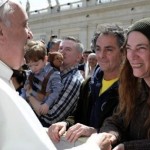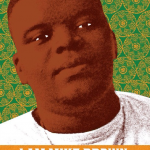Do you remember where you were on Saturday, July 13, 1985?
I do.
On that day in the summer of my 15th year, I sat in my pajamas all day glued to the television in my parents’ living room in Connecticut, watching the Live Aid concerts broadcast live from London and Philadelphia, determined not to miss a single second of my favorite bands’ performances.
While I watched the concerts unfold, something happened to me that, at the time, I could not have articulated the way I do now. But even then, I was cognizant of a change in my awareness of the world — a broadening of my horizon and expansion of what I understood my potential, as one person, to affect change globally could be. A seed of curiosity about my connection with and responsibility to fellow human beings on the other side of the world was planted and has continued to grow throughout my life and professional career.
Nine months before Live Aid, Boom Town Rats lead singer Bob Geldof — a few decades before he would earn his “Sir” — turned on the television one evening in October and watched the BBC’s Michael Buerk and Mohamed Amin deliver reports on the famine ravaging northern Ethiopia here below.
Outraged by what he saw in the BBC reports, a few days later Geldof hopped on a plane to Ethiopia determined to see for himself what was going on and what he and other Westerners could do to help alleviate the suffering.
A month after that, on Nov. 25, 1984, Geldof convened Band Aid — a gathering of some of the most popular UK and Irish pop/rock/new-wave musicians of the day — to record a song his journey to Ethiopia had inspired him to write: “Do They Know It’s Christmas?”
Four days later, on Nov. 28, 1984, the Band Aid single hit record store shelves. A few days after that, I bought my own copy in a suburban New England mall, took it back to the stereo in my bedroom, and played it nearly nonstop for the next six weeks.
Until I heard “Do They Know It’s Christmas?” I didn’t know anything about the famine in Ethiopia or where Eritrea even was. The music was the catalyst that led me to our Encyclopedia Britannica set in the family room where I read everything I could find about Ethiopia, Eritrea, and famines in Africa.
Thirty years later, I am a journalist who writes often about our collective spiritual, moral, and ethical responsibility to defend and support the poorest of the poor in Africa and elsewhere. As a journalist I have traveled to sub-Saharan Africa on several occasions to tell the stories of Africans who have and are continuing to lift themselves out of extreme poverty and disease. In 2012, I visited Ethiopia for the first time to witness some the progress it has made as a culture and a nation to combat the political, material, and cultural issues that led to that devastating famine in 1985.
I also am mother to Vasco, my 15-year-old son who was born into crippling poverty and disease in Malawi, Africa. He is almost the same age now that I was when Bono and Adam Clayton, Geldolf, Sting, George Michael, Midge Ure, Phil Collins, Bananarama, Paul Weller, Johnny Fingers, Boy George, Simon LeBon, John and Andy Taylor, Nick Rhodes, the guys from Kool and the Gang, and the rest headed into the studio in London in November 1984. And my lad is perhaps even more obsessed with music and world-changing than his mum was when she took the Band Aid LP from its plastic sleeve and popped it on her turntable for the first of thousands of times.
Now comes the scourge of the Ebola virus in West Africa and once again, American teenagers like my son are (re)learning their African geography, what being a citizen of the world actually means, and how it affects their responsibility to our neighbors — brothers and sisters, truly — from the other side of the globe.
Click HERE for 5 Questions about Ebola, answered with infographics
Were it not for the superstar recording sessions, the music, the concerts, and the pop culture icons who created them setting my life on the trajectory that they did all those years ago, I doubt whether I would be Vasco’s mother today. Words of gratitude to Band Aid and its cohorts, then and now, escape me.
But I can’t help wondering where the seeds planted in the hearts of teenagers who hear “Do They Know It’s Christmas? 2014” will take root, how the might grow and bloom between now and 2044.
Thirty years from now, may poverty, preventable diseases, and all plagues natural or man-made be but a faint memory.
And may each of us do what we can to feed, feel, and heal the world.
http://youtu.be/XTFIgoIhPUg http://youtu.be/44SEO3lsmhYBelow are the lyrics to Band Aid 30’s “Do They Know It’s Christmas?”
It’s Christmas time – and there’s no need to be afraid
At Christmas time – we let in light – and banish shade
And in our world of plenty – we can spread a smile of joy
Throw your arms around the world
At Christmas time
But say a prayer – pray for the other ones
At Christmas time – it’s hard but while you’re having fun
There’s a world outside your window – and it’s a world of dread and fear
Where a kiss of love can kill you – and there’s death in every tear
And the Christmas bells that ring there – are the clanging chimes of doom
Well tonight we’re reaching out and touching you
No peace and joy this Christmas in West Africa
The only hope they’ll have is being alive
Where to comfort is to fear
Where to touch is to be scared
How can they know it’s Christmas time at all
Here’s to you
Raise a glass to everyone
And here’s to them
And all their years to come
Let them know it’s Christmas after all
Feed the world – Let them know it’s Christmastime again
Feel the world – Let them know it’s Christmastime again
Heal the world – Let them know it’s Christmastime again












